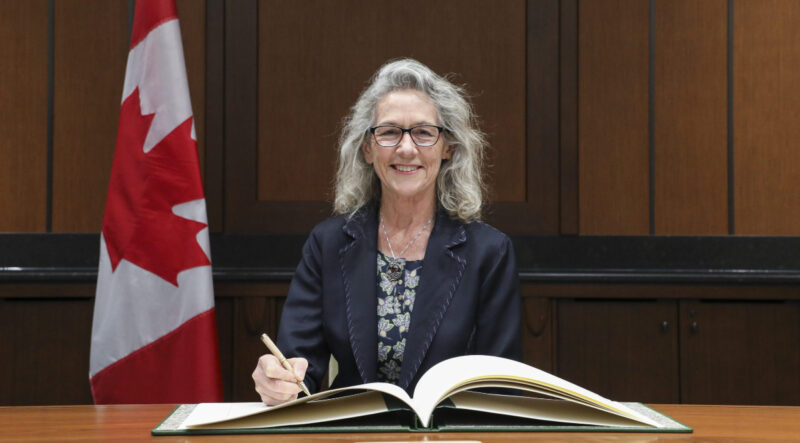Fisheries Minister provides “non-answers” for BC’s salmon farmers
“The decision will be made when it needs to be made,” – Fisheries Minister, Joyce Murray on the soon-to-expire aquaculture licences for BC’s salmon farmers.
By Fabian Dawson
SeaWestNews
The future of British Columbia’s open-net salmon farmers remains firmly in limbo as Federal Fisheries Minister, Joyce Murray, provided a series of “non-answers” at a press conference today, after unveiling an engagement report on Canada’s Blue Economy Strategy.
“The decision will be made when it needs to be made,” said Murray when asked if the Federal Government will renew 79 salmon farming licences in BC, which are set to expire June 30.
According to a recently released report, British Columbia’s indigenous and non-Indigenous coastal communities will lose more than 4,700 jobs and $1.2 billion in economic activity annually, if the 79 salmon farming licences are not renewed.
The renewal of these licences have been in limbo after Murray’s predecessor decided to phase out salmon farms in BC’s Discovery Islands, despite nine-peer reviewed studies that showed the marine operations had virtually no impact on wild stocks migrating through the area.
“In the meantime, we are developing a plan in consultation with industry and other stakeholders and as I said my goal is to have a very strong and sustainable finfish aquaculture industry here on the coast of BC,” she said.
“These are simply non-answers for salmon farmers who are facing critical and urgent issues that will impact thousands of livelihoods in BC…we need answers and we need them now,” said an industry official.
The stalling of the licences’ renewal is tied to the Liberal party’s pre-election pledge to come up with a plan to transition all open-net salmon farms in BC by 2025, that is being pushed for by anti-aquaculture activists.
Addressing a question on recent peer-reviewed studies by Canadian and American government scientists who found that open-net aquaculture poses less than a minimal threat to wild stocks, Murray said: “even should the risks be minimal, it is imperative that we address any manageable risks because of the potential impact on wild Pacific salmon.”
“We know that over the last number of years that wild Pacific salmon stocks have been declining from a variety of impacts some of which are not in our control, and some are in our control and so we have a commitment to transition from open-net pen aquaculture.
“I will be moving forward on that commitment as is in my mandate letter, said Murray, who is aligned with the anti-salmon farming lobby to end open-net aquaculture in BC.
Farm-raised salmon is BC’s highest valued seafood product and the province’s top agricultural export, generating over $1.6 billion towards the BC economy, resulting in nearly 6,400 jobs. BC salmon farmers hold agreements with 17 First Nations on B.C.’s coast. Several of the partnerships are asking for new permits to farm salmon while urging the government to renew their licences immediately.
“Aquaculture provides Indigenous Canadians with economic opportunities and well-paying jobs, drastically reducing unemployment in many small, coastal communities. Without aquaculture, and specifically farmed salmon, I know many people who will have difficulties in finding work,” said Richard Harry, executive director of the Aboriginal Aquaculture Association.
When asked if the government would respect First Nations who want open-net aquaculture in their traditional territories, Murray said that reconciliation with indigenous peoples on all three coasts and across Canada is a high priority for the government.
“This is a very central relationship which I take very seriously …the reason we are putting together a responsible plan is that we want to take the human element of course into consideration,” she said.
“We have been in consultation with them (indigenous communities that are involved with open net pen aquaculture) and I am looking forward to having a transition that will create more opportunities for indigenous people and indigenous communities to make BC a beacon of responsible, sustainable finfish aquaculture development.”
The Canadian seafood industry, represented by a partnership of the national associations representing wild and farmed seafood said the country needs a pragmatic, federal vision to grow the sector and drive innovation and investment in rural, coastal, and Indigenous communities.
“What is missing is a pathway to identify the next steps, clarify the priority areas, and focus on the economic opportunity before us,” said a joint statement by Paul Lansbergen, President of the Fisheries Council of Canada, and Timothy Kennedy, President & CEO of the Canadian Aquaculture Industry Alliance.
“Canada has the greatest potential in the world to grow our seafood sector. The seafood sector is the core of the Blue Economy with close to 100,000 jobs,” they said.
Murray in releasing the What We Heard Report: Engaging on Canada’s Blue Economy Strategy said Canada’s oceans are a tremendous economic resource.
“This report helps lay a foundation to build on the tremendous success of Canada’s fisheries and oceans, while protecting them for future generations,” she said.
The engagement process over 158 days last year involved 40 roundtables and more than 1,614 participants.
(Facebook image of Federal Fisheries Minister Joyce Murray)

